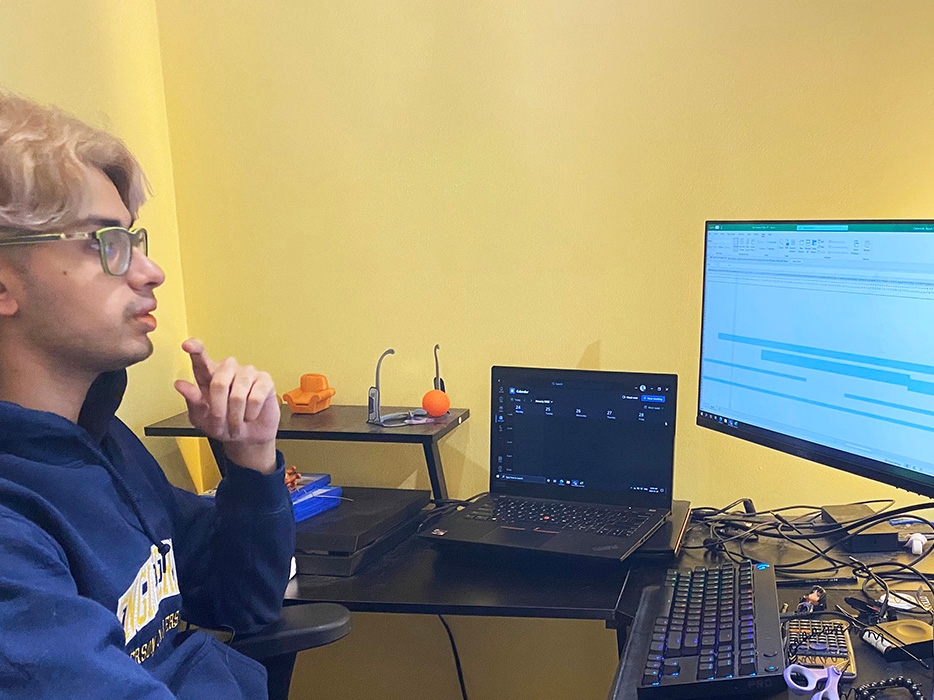FEAS supports co-op students as they navigate an uncharted future of work model

FEAS co-op students working remotely benefit from faculty guidance and skills gained through curriculum and extracurricular activities
The sudden closure of schools and offices due to the COVID-19 pandemic meant that many students had to adapt quickly to a new remote work model. By relying on skills gained through their curriculum and extracurricular activities, and with expert guidance and support from the Faculty of Engineering and Architectural Science (FEAS), co-op students excelled in this new work environment, meeting challenges with resilience, adaptability and openness.
Aayush Chakravartti, an undergraduate biomedical engineering student
Fourth-year biomedical engineering student Aayush Chakravartti began working from home during the pandemic as a lifecycle management co-op student at Sanofi Pasteur. While he experienced some connectivity issues and missed in-person interactions with coworkers, Chakravarrtti made the most of his remote work experience. “I created a professional support system with my team and other co-ops in my department,” he said.
The FEAS representatives at the Career and Co-op Centre helped Chakravartti attain his co-op position by providing constructive criticism on his resume and cover letter. Additionally, the organizational skills he gained through various campus and student group positions, including CEN 100 project manager and VP of Logistics for the Biomedical Engineering Course Union, were critical to landing his role. Chakravartti also gained valuable negotiation and conflict management skills as the previous Biomedical Director for the Ryerson Engineering Student Society (RESS) (external link, opens in new window) .
The most significant takeaway from his remote co-op experience – which eventually pivoted to an in-person role for Chakravartti – is an increased understanding of his fellow employees. “While distractions may be considered unprofessional in an in-person setting, I now have more empathy for others managing them,” said Charavartti.
Rabeen Raveendrakumar, an undergraduate chemical engineering student
For 16 months, fourth-year chemical engineering student Rabeen Raveendrakumar worked remotely as a pipeline engineer co-op student at Enbridge Gas Inc. FEAS provided Raveendrakumar with the tools to attain this valuable professional experience through the online co-op portal (opens in new window) . “I was very grateful for my position,” he said. “I tried to make the best of it by taking on numerous projects, adapting well to complete them and learning as quickly as possible.”
To successfully manage a demanding course load throughout his university career, Raveendrakumar developed strong time management skills that proved helpful in his co-op placement. “During a busy stretch close to construction season, many drawings came into the engineering queue for review, and we were short-handed,” he said. “Fortunately, the skills I gained as a FEAS student and my attention to detail allowed me to handle the heavy workload efficiently.”
Working at Enbridge allowed Raveendrakumar to improve his communication and adaptability, two skills he found essential while working remotely. “I have also learned the importance of asking questions when clarification is needed, no matter how trivial they may appear.”
Jwalit Bharwani, an undergraduate mechanical engineering student
Mechanical engineering student Jwalit Bharwani held two hybrid co-op positions during the pandemic. In the summer of 2020, he interned at Owens Corning Toronto, and in the summer of 2021, he worked at The Clifford Group. “Both roles were mainly in the office since they were manufacturing and construction projects-related, but the meetings were all held virtually,” said Bharwani.
Bharwani secured his positions by monitoring the FEAS networking emails and attending recruitment sessions and resume and cover letter workshops hosted by the faculty and student groups. His previous positions as social media coordinator for FEAS, CEN 100 project manager and (google form) Leaders’ League (external link, opens in new window) facilitator for the First Year Engineering Office taught him to take initiative and work well independently.
These skills allowed him to excel at the virtual aspects of his co-op placements. “Being punctual, having appropriate technology and resources, maintaining a healthy work-life balance and regularly updating management allowed me to have a productive and enjoyable co-op experience.”
All FEAS undergraduate programs offer paid full-time co-operative opportunities. Co-operative education has been shown to increase career readiness, improve job skills and even lead to higher starting salaries for engineering graduates. To help students become career-ready, programs such as NEXT provide free networking, goal-setting and leadership training for second-year FEAS students. Additionally, as the Ryerson Women in Engineering Engineer-in-Residence, Lyla Garzouzi can answer questions about co-op and life in the engineering profession.